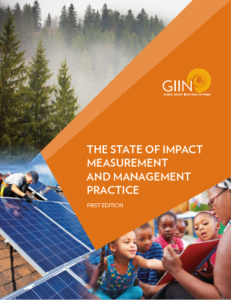December 11, 2017
Global Impact Investing Network Report Includes CEI's Annual Impact Data
NEW YORK, December 7, 2017 – A new report, published by the Global Impact Investing Network (GIIN), provides a comprehensive survey of the state of impact measurement and management (IMM) in the impact investing industry. The State of Impact Measurement and Management Practice, which captures data from 169 impact investors, provides valuable insight into how these organizations are assessing their social and environmental impact and how they are using that information for decision-making.
Key findings include:
- Impact investors actively seek to understand and manage their impact. IMM is sometimes seen as a compliance or reporting activity; this research shows that IMM is actually a management tool, actively used by investors in a variety of ways to improve both their impact and business performance.
- Impact Investors are motivated to achieve diverse types of impact through their investments and their approaches to IMM are designed to understand progress on those specific impact objectives. This diversity can be seen in the types of impact they seek to achieve and the groups of people they aim to benefit, such as women and girls or individuals of a certain socioeconomic status. The United Nations Sustainable Development Goals (SDGs) a common framework for defining impact goals. 42% of respondents seek to use their capital to address one or more of the SDGs, such as affordable and clean energy, decent work, and gender equality.
- Impact investors use a variety of resources to measure and manage their impact. The majority of impact investors (62%) use IRIS – a catalog of metrics and guidance managed by the GIIN – to define key indicators, while 41% use B Analytics, and 26% use the Principles for Responsible Investment.
- Both intrinsic and explicit incentives drive the activities of impact investors. Although most respondents said their staff and investees are intrinsically motivated by impact, several investors have applied creative strategies to bake impact incentives into their business practices, such as tying impact targets to staff compensation or follow-on capital for investees.
- Although investors note significant progress in the utility of IMM practice, defining fundamentals for understanding impact, as well as in the sophistication of tools and frameworks available, fragmentation in approaches to IMM remains a significant challenge.
“To fully realize the potential of impact investing, the industry needs to effectively integrate impact considerations into the investment process,” said Amit Bouri, the GIIN’s Chief Executive Officer. “This means information on impact should be considered alongside risk, return, and liquidity factors, so investors can manage their portfolio toward both impact and financial objectives. This report provides first-of-its-kind information about the emerging practice of impact measurement and management, which aims to enable investors to use both impact and financial data for decision-making.”
GIIN’s Director of Impact Measurement and Management, Kelly McCarthy, added, “The GIIN’s research shows that nearly all impact investors report their impact performance in some way, but there is still progress to be made in terms of establishing norms for how we integrate impact into investment decision-making. This report reinforces the importance of transparency, credibility, and accountability in impact measurement and management practice across the impact investing industry as it continues to evolve and grow.”
What is IMM? Impact measurement is the process of setting impact goals and targets, selecting appropriate metrics, collecting and analyzing data, evaluating impact, and reporting to stakeholders (internal and external). Impact management is the process of assessing the impacts of an investment on people and the planet and using that information to inform investment strategy and to improve performance.
About the GIIN:
The Global Impact Investing Network (GIIN) is a nonprofit organization dedicated to increasing the scale and effectiveness of impact investing around the world. Impact investments are investments made into companies, organizations, and funds with the intention to generate social and environmental impact alongside a financial return. Impact investments can be made in both emerging and developed markets, and target a range of returns from below market to market rate, depending upon the circumstances. The GIIN builds critical infrastructure and supports activities, education, and research that help accelerate the development of a coherent impact investing industry. For more information, please visit www.thegiin.org.
*CEI participated in the GIIN survey and contributed data to the report.




